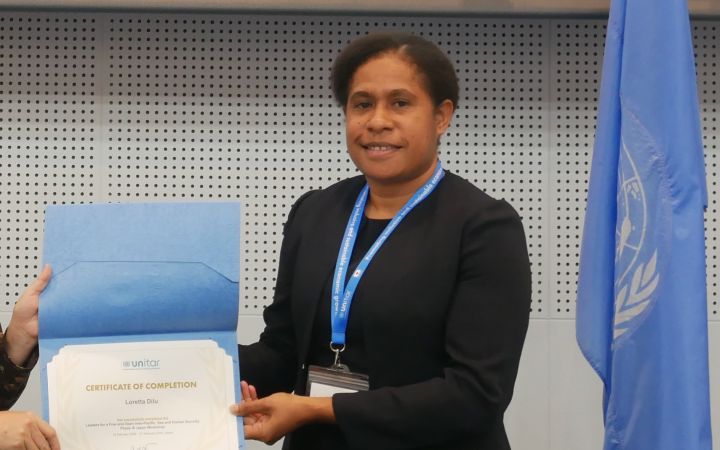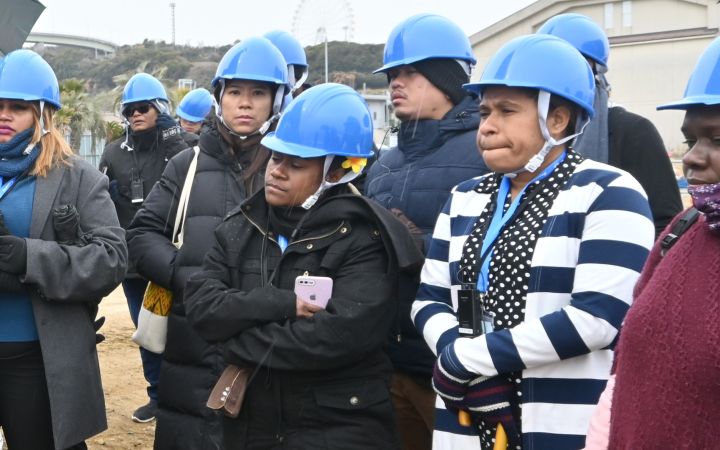- Loretta Dilu, an academic and researcher in strategic management from Papua New Guinea, completed the 2024 UNITAR Leaders for a Free and Open Indo-Pacific: Sea and Human Security programme.
- Despite having little prior knowledge of the topic, Loretta was among the top performers who advanced to the final phase of the training programme, thanks to her dedication and exceptional performance.
- One of Loretta’s key takeaways from the training was the power of collective action. After the UNITAR programme, she initiated a lake restoration project that not only benefits the environment but also empowers local communities.
- Loretta recognizes that environmental challenges require collective solutions and encourages individuals to believe in their ability to create positive change.
10 April 2025, Hiroshima, Japan - University lecturer Loretta Dilu joined the 2024 UNITAR Leaders for a Free and Open Indo-Pacific: Sea and Human Security training programme with little prior knowledge of sea and human security. However, through her perseverance, she distinguished herself and was selected to advance to the final phase of the programme.
Through the training programme, Loretta not only deepened her understanding of sea and human security but also developed a newfound appreciation for the intricate connections that sustain our world. She will apply these insights to her academic research, renewing her commitment to societal progress.
Overcoming Unfamiliarity with Sea and Human Security
Loretta is an academic and researcher in Papua New Guinea. Specializing in strategic management, she has always sought to apply insights from her studies to make meaningful contributions to society. When she learned about the UNITAR training programme, which emphasizes the role of research in addressing critical sea and human security challenges, she was immediately drawn to it and applied without hesitation.
The 2024 UNITAR Sea and Human Security training programme ran from July 2024 to February 2025. Its goal was to equip participants from the Asia-Pacific region with the skills to address pressing sea and human security challenges through practical solutions and to foster regional collaboration. The programme, supported by the Government and People of Japan, began with an online phase, where over 900 participants enrolled in an asynchronous learning platform and webinar series.
Coming from her background in strategic management, Loretta had little exposure to the concept of sea and human security. However, rather than being discouraged by this unfamiliarity, she embraced the opportunity to expand her knowledge. What resonated with her the most was the profound interconnection between humans, the environment, animals and plants.
I learned … that the world we live in – humans, the environment, plants and animals – are all … interconnected. No matter what we do on land, it affects the ocean. —Loretta Dilu, researcher and UNITAR alumna, Papua New Guinea
Excelling and Advancing to the Final Phases
Loretta’s dedication and enthusiasm in the online phase set her apart, earning her a place in the second phase – a regional workshop held in Nadi, Fiji, in October 2024. Travelling abroad for the first time, she was captivated by the opportunity to engage with fellow participants from diverse backgrounds.
One of the most memorable experiences for her was the study tour to Viseisei Village, where participants learned about the village’s efforts to sustain its natural resources in the face of climate-related hazards, including rising sea levels, while collaboratively working towards sustainable economic development. She was particularly impressed by how well the community was organized, built on strong communication and collaboration between village chiefs and residents.
Harnessing the Power of Collective Action
Loretta’s learning didn’t stop there. When UNITAR selected the top 50 performers to join the final phase of the programme – an in-person workshop in Japan – Loretta was among them.
Her first experience in Japan was “mind-blowing”. Loretta was immediately struck by her fellow participants’ technological proficiency and appreciated learning from them through the group work and discussions.
Beyond the participant interactions, the Japanese experiences and best practices she was exposed to left a lasting impression on her and sparked her eagerness to apply similar initiatives in her home country. Loretta was especially motivated by the grass-roots collective action in Japan to drive positive change. She also admired Japan’s ability to integrate nature-based solutions into environmental protection while also using advanced technologies.
Turning Knowledge into Action
Having completed eight months of intensive training, Loretta is ready to transform the insights she gained into practical solutions. Inspired by microplastic fieldwork during the Japan workshop, Loretta designed a wetland conservation project aimed at restoring and preserving polluted local lakes. The project will improve lake hygiene by collecting and recycling marine litter. She actively involves youth in this initiative to expand the project’s reach and empower local communities to take ownership of their environment.
Loretta will also continue her research and publication work, through which she aims to influence policy to address critical social issues in her country.
The skills I gained from this programme will greatly enhance my ability to write policy briefs and conduct research to tackle issues in my country. —Loretta Dilu, researcher and UNITAR alumna, Papua New Guinea
Recognizing the significance of sea and human security, Loretta encourages people to believe in their ability to drive positive change. She emphasizes that collective efforts, no matter how small, can contribute to a more sustainable and resilient future for all.
You have to believe in yourself and be determined in whatever you do. We all have the potential to address the environmental challenges we face, and it requires everyone’s contribution, regardless of background or experience. —Loretta Dilu, researcher and UNITAR alumna, Papua New Guinea
About UNITAR
The United Nations Institute for Training and Research (UNITAR) is a dedicated training arm of the United Nations. In 2024, UNITAR trained over 550,000 learners around the world to support their actions for a better future. UNITAR has a global presence, with offices in Geneva, Hiroshima, New York and Bonn and networks around the world. Find out more at www.unitar.org



